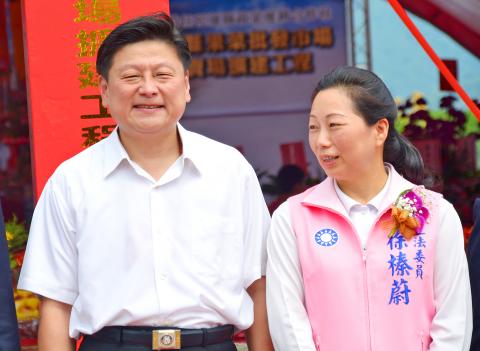The Supreme Court yesterday upheld a guilty verdict by the Taiwan High Court against Hualien County Commissioner Fu Kun-chi (傅崐萁) for insider trading and sentenced him to eight months in prison, bringing to a close a legal battle that lasted for 14 years.
The Ministry of the Interior last night relieved Fu of his duties, effective immediately.
Fu was accused in 2005 of breaching the Securities and Exchange Act (證券交易法) by manipulating the stock price of Hold-Key Electric Wire & Cable Co Ltd (合機電線電纜) through insider trading.

Photo: Wang Chun-chi, Taipei Times
Fu, then a People First Party legistlator, was approached by Hold-Key general manager Yang Kai-ti (楊愷悌) and deputy general manager Yu Su-yuan (余素緣), who offered him 20 million company shares at NT$15 per share, the Supreme Court ruling said.
Hold-Key had just won a bid to build an electric supply system for state-run Taiwan Power Co (台電), and Yang and Yu saw it as an opportunity to boost the company’s stock price, it said.
Fu brought in friends and stock market analyst Chang Shih-chieh (張世傑), who convinced people that the stock was a good investment, the ruling said.
The Hold-Key stock price soared from NT$15 per share in October 2003 to NT$47 per share in January 2004, earning Fu and the others a total of NT$96 million (US$3.11 million at the current exchange rate) in illicit gains, it added.
Fu was originally sentenced to one year and four months in prison by the second appellate court, but his jail term was reduced to eight months, as the case was eligible for a sentence reduction according to the Criminal Speedy Trial Act (刑事妥速審判法), yesterday’s ruling said.
The Hualien County District Prosecutors’ Office yesterday said it had received a notice from the Supreme Court to impose travel restrictions on Fu and had instructed harbor and airport authorities to deny Fu passage should he try to leave the nation.
Ministry of the Interior Department of Civil Affairs Director Lin Ching-chi (林清淇) said that Fu had been dismissed as county commissioner per Article 79 of the Local Government Act (地方制度法).
The Executive Yuan would be notified of the need to appoint an acting commissioner, as the regulations stipulate that the deputy commissioner is to be relieved of their duties as well, Lin said.
Given the timing of the Supreme Court’s announcement, the dismissal paperwork would take some time, Lin added.
While the ministry holds the right to nominate a replacement, the Executive Yuan holds the deciding vote, Lin said.
Minister of the Interior Hsu Kuo-yung (徐國勇) said the ministry had yet to nominate anyone for acting commissioner.
“The ministry must receive the court ruling before we can have the Executive Yuan approve any candidates,” Hsu said.
The acting commissioner would serve until Dec. 25 when the winner of the Nov. 24 Hualien commissioner race would assume office, Lin said.
Additional reporting by CNA

INVESTIGATION: The case is the latest instance of a DPP figure being implicated in an espionage network accused of allegedly leaking information to Chinese intelligence Democratic Progressive Party (DPP) member Ho Jen-chieh (何仁傑) was detained and held incommunicado yesterday on suspicion of spying for China during his tenure as assistant to then-minister of foreign affairs Joseph Wu (吳釗燮). The Taipei District Prosecutors’ Office said Ho was implicated during its investigation into alleged spying activities by former Presidential Office consultant Wu Shang-yu (吳尚雨). Prosecutors said there is reason to believe Ho breached the National Security Act (國家安全法) by leaking classified Ministry of Foreign Affairs information to Chinese intelligence. Following interrogation, prosecutors petitioned the Taipei District Court to detain Ho, citing concerns over potential collusion or tampering of evidence. The

NEGOTIATIONS: The US response to the countermeasures and plans Taiwan presented has been positive, including boosting procurement and investment, the president said Taiwan is included in the first group for trade negotiations with the US, President William Lai (賴清德) said yesterday, as he seeks to shield Taiwanese exporters from a 32 percent tariff. In Washington, US Trade Representative Jamieson Greer said in an interview on Fox News on Thursday that he would speak to his Taiwanese and Israeli counterparts yesterday about tariffs after holding a long discussion with the Vietnamese earlier. US President Donald Trump on Wednesday postponed punishing levies on multiple trade partners, including Taiwan, for three months after trillions of US dollars were wiped off global markets. He has maintained a 10 percent

TRADE: The premier pledged safeguards on ‘Made in Taiwan’ labeling, anti-dumping measures and stricter export controls to strengthen its position in trade talks Products labeled “made in Taiwan” must be genuinely made in Taiwan, Premier Cho Jung-tai (卓榮泰) said yesterday, vowing to enforce strict safeguards against “origin laundering” and initiate anti-dumping investigations to prevent China dumping its products in Taiwan. Cho made the remarks in a discussion session with representatives from industries in Kaohsiung. In response to the US government’s recent announcement of “reciprocal” tariffs on its trading partners, President William Lai (賴清德) and Cho last week began a series of consultations with industry leaders nationwide to gather feedback and address concerns. Taiwanese and US officials held a videoconference on Friday evening to discuss the

PERSONAL DATA: The implicated KMT members allegedly compiled their petitions by copying names from party lists without the consent of the people concerned Judicial authorities searched six locations yesterday and questioned six people, including one elderly Chinese Nationalist Party (KMT) member and five KMT Youth League associates, about alleged signature forgery and fraud relating to their recall efforts against two Democratic Progressive Party (DPP) legislators. After launching a probe into alleged signature forgery and related fraud in the KMT’s recall effort, prosecutors received a number of complaints, including about one petition that had 1,748 signatures of voters whose family members said they had already passed away, and also voters who said they did not approve the use of their name, Taipei Deputy Chief Prosecutor